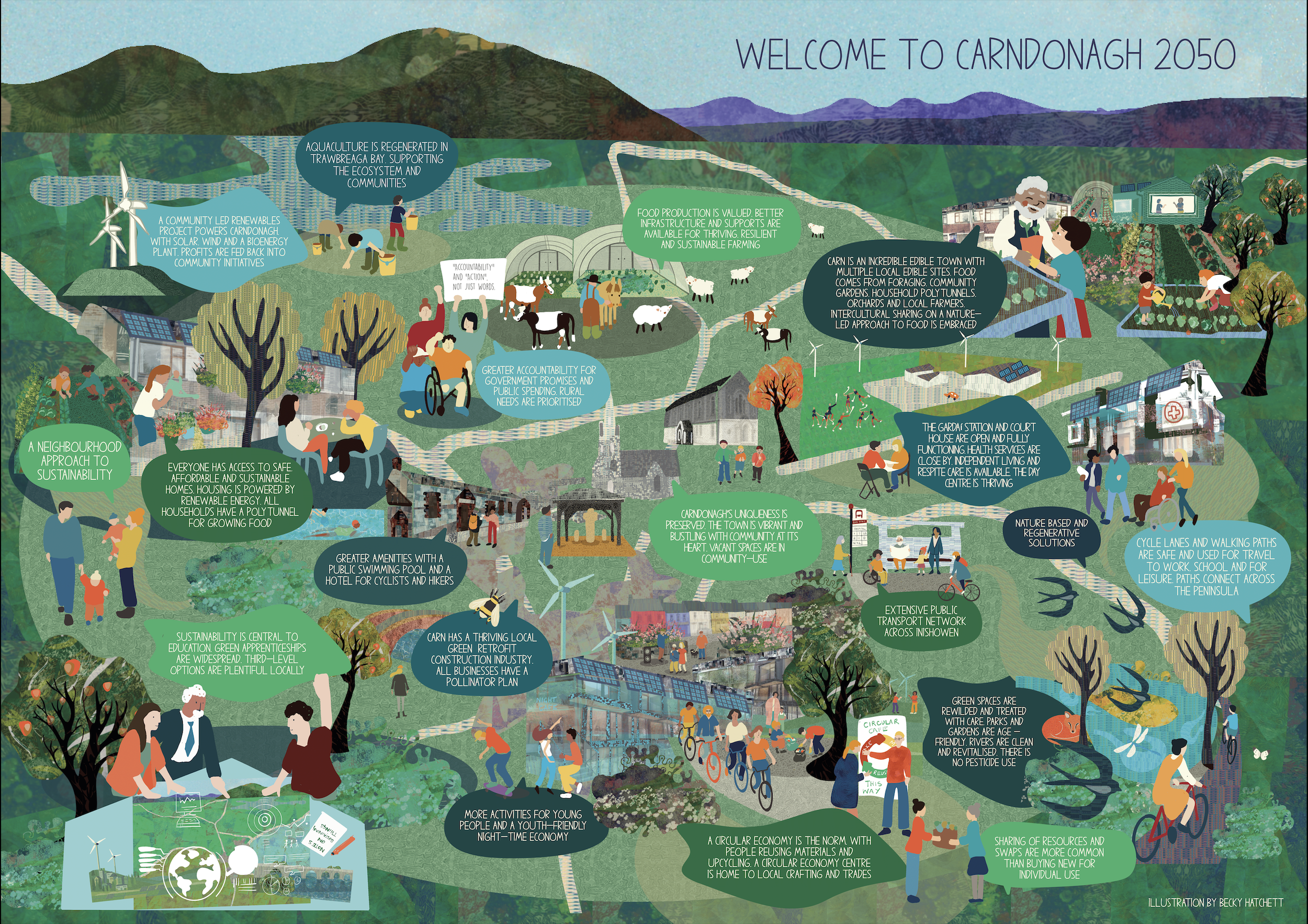
The report has been published in partnership with Inishowen Development Partnership, ECO Carn, Donegal County Council, supported by AIB and Research Ireland.
The People’s Transition in Carndonagh
The Carndonagh People’s Transition began in June 2024 as a collaborative effort to design climate actions that align with the community’s development needs and priorities.
The project unfolded in three phases: mapping, community engagement, and the co-creation of solutions. The mapping phase focused on understanding the area’s geography, demographics, and key community institutions to ensure inclusion. The engagement phase tapped into Carndonagh’s strong voluntary network, using workshops, focus groups, interviews, and surveys to capture community priorities. Residents consistently highlighted the strength of local social connections, the importance of protecting natural habitats, and the need for climate actions that are community-driven rather than imposed. Key concerns included employment opportunities, affordable housing – particularly in light of the mica crisis – and access to essential services.
Building on these findings, a set of actions was co-created to link climate goals with tangible local benefits. These include a training and apprenticeship programme to develop green skills such as retrofitting, ecology, and horticulture, supporting job creation and a just transition. Another proposal is the creation of community food-growing spaces under an “edible neighbourhood” model, promoting sustainable food practices and social cohesion. A third initiative, led by ECO Carn, focuses on educating residents about Carndonagh’s rivers and fostering their protection. These actions complement the town’s designation as a Decarbonising Zone and reflect a shared vision of a thriving community that regenerates its environment while addressing pressing social and economic challenges.
Project phases
-
The first phase was the mapping phase which aimed to build a picture of the Carndonagh community, outlining a geographical scope for the project that represents the people who live there. The key was understanding how people within the community could be included by assessing who was at the greatest risk of being excluded. In addition to demographics and circumstances, the area was studied to understand the distribution of institutions and organisations, such as schools, churches, and community groups, that play a significant role in the locality.
-
The mapping phase informed the rollout of the second phase – the community engagement phase. Key enabling factors for this phase were an active community and voluntary network in Carndonagh. TASC was conscious that this report tapped into the good will of the community and the deep interest of people in improving their area. This made the community engagement phase easier and is a strong base to take forward the project actions. To gather information on community needs and priorities, participatory workshops were held with the wider community. Alongside this, focus group discussions were organised with groups across the community. Interviews were also held with stakeholders working in community development and climate action. Throughout the community engagement phase an online survey was promoted in the community to ensure that the emerging picture was correct.
-
Based on these consultations, actions were co-created with members of the community at an action planning workshop, and with project stakeholders. The actions detailed in this report seek to address the priorities of the community to ensure that climate action provides tangible benefits, highlighting the positives of a just transition.
Solutions: co-creating sustainable pathways
Green Skills
The first proposed action is to build a training and apprenticeship programme in key green skills in Carndonagh. Across the community consultations, the importance of locally available training opportunities was raised. Green jobs are seen as a major source of job growth in the future of work, with skills development programmes crucial to the achievement of a just transition. Ireland’s National Climate Action Plan states that people must be equipped with the right skills to be able to participate in and benefit from the future net-zero economy. On-the-job training is an important element of green skill building. Through the consultations and action-planning process, skills building in retrofitting, ecology and horticulture were recognised as important for the local area, and skills that could be supported through local apprenticeships.
Edible Neighbourhoods
The second action seeks to use public and common spaces across Carndonagh for community food growing as part of an edible neighbourhood approach. This action promotes sustainable approaches to food through the growing of edibles in public places. Community growing spaces can serve as multifunctional nature-based solutions to achieve climate and social benefits.
Learning from Rivers
The third action, developed by members of ECO Carn would look at building education on the cultural heritage and biodiversity of Carndonagh’s rivers and developing actions to support their protection. It would draw on the skills across ECO Carn members on heritage, waterways, and biodiversity. Learning both from nature and from diverse cultures will be a key component of this action, through sharing and exchange of river stories from new communities in Carndonagh.





